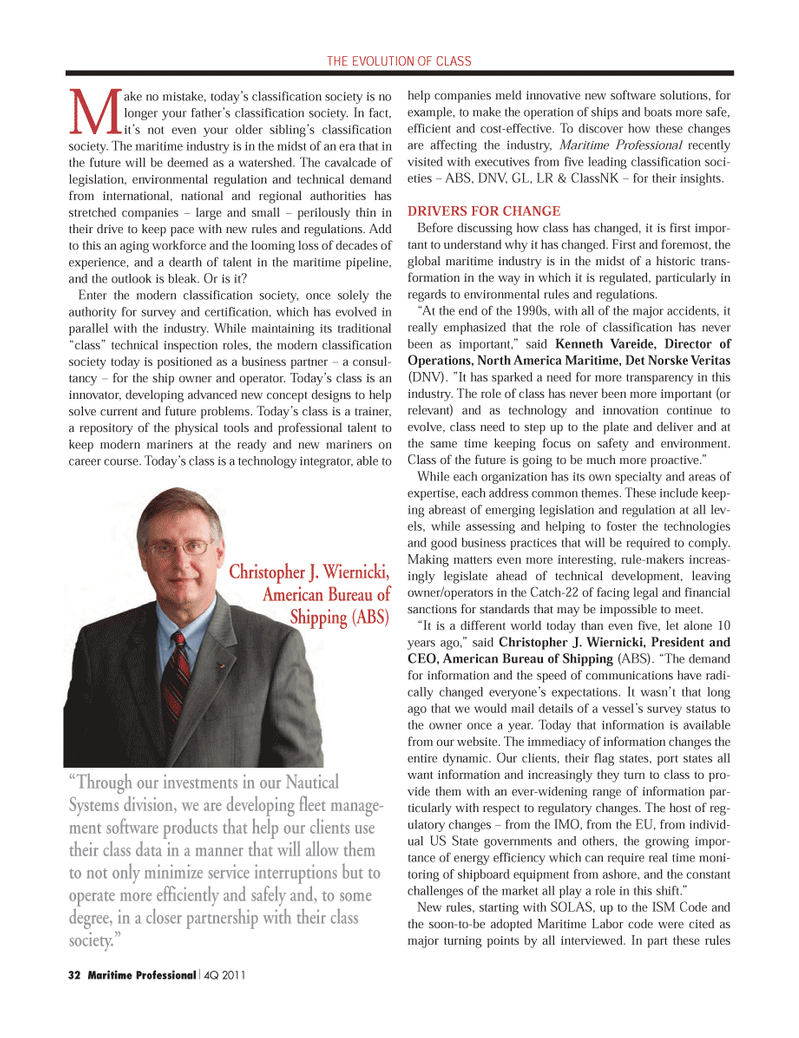
Page 32: of Maritime Logistics Professional Magazine (Q4 2011)
Classification
Read this page in Pdf, Flash or Html5 edition of Q4 2011 Maritime Logistics Professional Magazine
32 Maritime Professional 4Q 2011Make no mistake, today?s classification society is no longer your father?s classification society. In fact, it?s not even your older sibling?s classification society. The maritime industry is in the midst of an era that in the future will be deemed as a watershed. The cavalcade of legislation, environmental regulation and technical demand from international, national and regional authorities has stretched companies ? large and small ? perilously thin in their drive to keep pace with new rules and regulations. Add to this an aging workforce and the looming loss of decades of experience, and a dearth of talent in the maritime pipeline, and the outlook is bleak. Or is it?Enter the modern classification society, once solely the authority for survey and certification, which has evolved in parallel with the industry. While maintaining its traditional ?class? technical inspection roles, the modern classification society today is positioned as a business partner ? a consul- tancy ? for the ship owner and operator. Today?s class is an innovator, developing advanced new concept designs to help solve current and future problems. Today?s class is a trainer, a repository of the physical tools and professional talent tokeep modern mariners at the ready and new mariners on career course. Today?s class is a technology integrator, able to help companies meld innovative new software solutions, for example, to make the operation of ships and boats more safe, efficient and cost-effective. To discover how these changes are affecting the industry, Maritime Professional recentlyvisited with executives from five leading classification soci- eties ? ABS, DNV, GL, LR & ClassNK ? for their insights. DRIVERS FOR CHANGEBefore discussing how class has changed, it is first impor- tant to understand why it has changed. First and foremost, theglobal maritime industry is in the midst of a historic trans-formation in the way in which it is regulated, particularly in regards to environmental rules and regulations. ?At the end of the 1990s, with all of the major accidents, it really emphasized that the role of classification has never been as important,? said Kenneth Vareide, Director of Operations, North America Maritime, Det Norske Veritas (DNV). ?It has sparked a need for more transparency in this industry. The role of class has never been more important (or relevant) and as technology and innovation continue to evolve, class need to step up to the plate and deliver and at the same time keeping focus on safety and environment. Class of the future is going to be much more proactive.? While each organization has its own specialty and areas of expertise, each address common themes. These include keep- ing abreast of emerging legislation and regulation at all lev- els, while assessing and helping to foster the technologiesand good business practices that will be required to comply. Making matters even more interesting, rule-makers increas- ingly legislate ahead of technical development, leaving owner/operators in the Catch-22 of facing legal and financial sanctions for standards that may be impossible to meet.?It is a different world today than even five, let alone 10 years ago,? said Christopher J. Wiernicki, President and CEO, American Bureau of Shipping (ABS). ?The demandfor information and the speed of communications have radi- cally changed everyone?s expectations. It wasn?t that long ago that we would mail details of a vessel?s survey status to the owner once a year. Today that information is available from our website. The immediacy of information changes the entire dynamic. Our clients, their flag states, port states allwant information and increasingly they turn to class to pro- vide them with an ever-widening range of information par- ticularly with respect to regulatory changes. The host of reg- ulatory changes ? from the IMO, from the EU, from individ- ual US State governments and others, the growing impor- tance of energy efficiency which can require real time moni- toring of shipboard equipment from ashore, and the constantchallenges of the market all play a role in this shift.? New rules, starting with SOLAS, up to the ISM Code and the soon-to-be adopted Maritime Labor code were cited asmajor turning points by all interviewed. In part these rules THE EVOLUTION OF CLASS ?Through our investments in our Nautical Systems division, we are developing fleet manage- ment software products that help our clients use their class data in a manner that will allow them to not only minimize service interruptions but to operate more efficiently and safely and, to some degree, in a closer partnership with their class society.? Christopher J. Wiernicki, American Bureau of Shipping (ABS) MP #4 (18-33):MP Layouts 11/8/2011 1:38 PM Page 32

 31
31

 33
33
